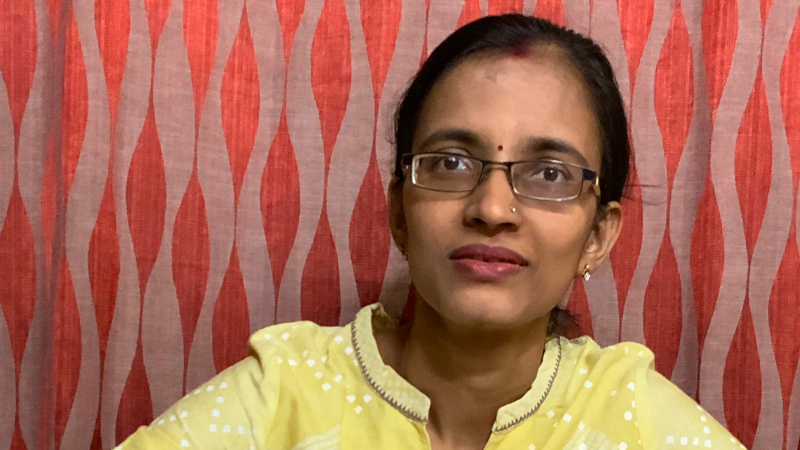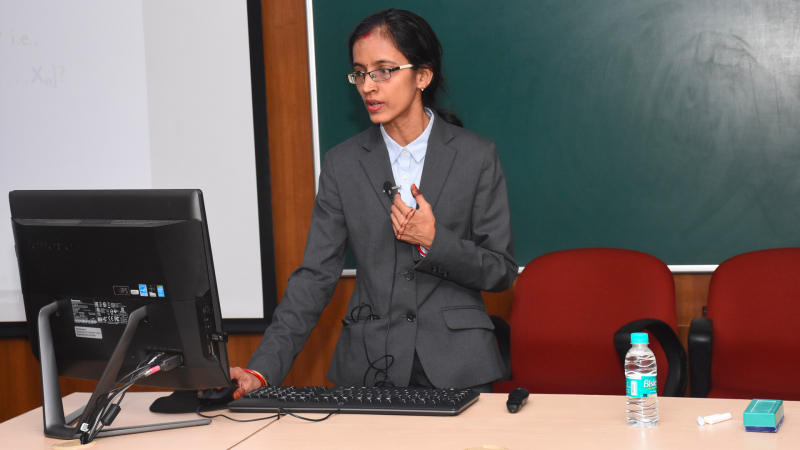Throughout her childhood, she dreamed of a career in mathematics. And now her dream has come true. Today, she is an outstanding researcher and an award winner for her breakthrough discoveries in affine algebraic geometry.
Mathematician Neena Gupta of India is the recipient of the 2023 TWAS-CAS Young Scientist Award, established in 2020 to acknowledge the scientific achievements attained by young scientists under 45 living and working in a developing country. The award is sponsored by Lenovo Ltd, China's leading PC company and a global technology leader, and carries a cash prize of US$10,000. The 2023 edition acknowledged outstanding results in mathematics and artificial intelligence.

Gupta received this recognition because she found the way to solve the longstanding 'Zariski Cancellation Problem' (ZCP), first posed in 1949 by the Russian-born American mathematician Oscar Zariski, an eminent founder of modern algebraic geometry.
The ZCP was long considered one of the biggest challenges in algebraic geometry, and many mathematicians worldwide have struggled to find a solution. But Gupta succeeded.
"This award strongly motivates me to cultivate further my passion for investigating unresolved fundamental mathematical problems," said Gupta, who was elected a TWAS Young Affiliate in 2020. "The TWAS-CAS award is one of the great achievements of my life."
To clarify what the 'Zariski Cancellation Problem for affine spaces' is about, she offered a simplified explanation: "You have two geometric objects and you 'add a dimension' to each by considering the cylinders over them. If the cylinders have the same structure, can you deduce that the original objects have the same structure?"
Gupta became passionate about the Zariski problem when she was a PhD student at the Indian Statistical Institute (ISI), in 2011. "I had some ideas that I explained to Professor Teruo Asanuma, an outstanding mathematician who was visiting ISI at that time. He said 'Neena, this is really very difficult'. He was apprehensive that attempting such a problem would lead me nowhere."
Nonetheless, she didn't give up, and after three years of work, she came up with the complete solution in 2014. She recalled that her mentors Professor S.M. Bhatwadekar (then at the Tata Institute of Fundamental Research) and Professor Amartya K. Dutta of the Indian Statistical Institute checked the details and helped her organise her work into a paper assuring her that her result was correct. On the other hand, she could clearly perceive that most experts could not believe that a then-unknown young scientist like her had solved such a problem.

"My feeling when I obtained the ZCP solution is difficult to express," Gupta said. "But working at its solution has never been exhausting for me. After solving a problem, I sometimes go deeper into it, and sometimes involve myself in reading and understanding other problems."
Even if the ZCP has no immediate applications in day-to-day life, still it is of pivotal importance in the development of certain branches of knowledge with applications in real life. In Gupta's words it is "... a brilliant exercise of the mind with potential indirect real-life applications."
Regarding the impact of the prize on her career, she said: "Recognitions can play a huge role in shaping one's research priorities and rejuvenating a research theme. They push me to pursue further research on that theme, but they also increase the visibility of the work and thereby stimulate other mathematicians to make or attempt fruitful contributions around that area."
The TWAS-CAS award is just the latest recognition in her prize list: all major awards that she has received acknowledge both the ZCP, and her overall work in affine algebraic geometry and commutative algebra.
In 2022, the President of India conferred on her the Nari Shakti Puraskar, the highest honour for women in India. In 2021, she received the Ramanujan Prize, administered jointly by ICTP and the International Mathematical Union, for solving the ZCP and for her "... impressive algebraic skill and inventiveness". And in 2019, she received the Shanti Swarup Bhatnagar Prize from the Council of Scientific and Industrial Research, for her outstanding work in science and technology in India, and the ZCP.
Today, Gupta is a professor in the Statistics and Mathematics Unit at ISI, in Kolkata. She keeps on developing new algebraic theories, and searching for unresolved math problems. Maths, she noted, isn't for men only. "There are many excellent women mathematicians who just need a bit of encouragement to blossom. They should not give up, as I didn't," was her exhortation. Professor Emmy Noether—the mother of commutative algebra—is a well-known example, as she has been selected for the 2025 AWM-AMS Noether lecture.
"Sometimes, receiving an award puts you under big pressure. However, there are still many open problems that await a solution. It's a challenge that thrills me," she said.
Cristina Serra

